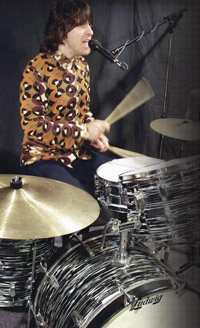
Modern Drummer

Kurt Reil
Creating The Right Vibe
When New Jersey psychedelic revivalists The Grip Weeds decided to remix, remaster, and reissue their 1994 debut album, House Of Vibes, it didn’t hurt that the band’s drummer and lead singer, Kurt Reil, is also a professional recording engineer. “House Of Vibes was an eight-track recording done on a shoestring budget,” the drummer recalls. “The drums were a stereo mix to two tracks, so we were very locked in with what existed.
“The idea was to make it sound as full-range as possible,” Reil continues, “while being respectful of what was there. Listening to the tracks, I knew I could enhance them by using my ears and trusting my instincts to create something that works in the context of 2007.” The vibrant results, House Of Vibes Revisited, shimmers with chiming ’60s-style guitars, lush harmonies, and Kurt’s powerhouse drumming, which recalls his primary influence, Keith Moon.
Kurt’s studio is also named House Of Vibes, and the drummer/engineer is well-known among area musicians for the work he does there with his brother, Grip Weeds guitarist Rick Reil. Among the recent projects are several recordings with The Smithereens. On Meet The Smithereens, a re-recording of The Beatles’ first album, Kurt worked with drummer Dennis Diken “in a very specific way to capture the essence of Ringo Starr” without losing Diken’s own drumming imprint.
On 7th Inning Stretch, the soundtrack to an ESPN special featuring Smithereens singer Pat Dinizio, Diken and company re-recorded three of their major hits, presenting Kurt with a “how to” lesson in capturing drum sounds from the ’80s. “Songs like ‘Blood And Roses’ and ‘Only A Memory’ were recorded during the period when reverb was liberally applied to the snare drum,” Reil explains, “along with gating and treatments that aren’t done much anymore. To deconstruct these songs, discover how they were put together, and actually record them was like taking ‘Recording 101.’ I learned a lot about how the drums worked on those records.”
Gail Worley
